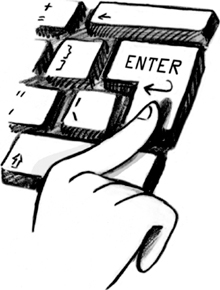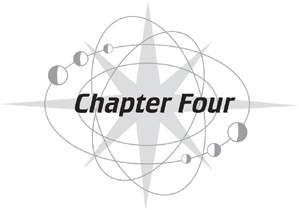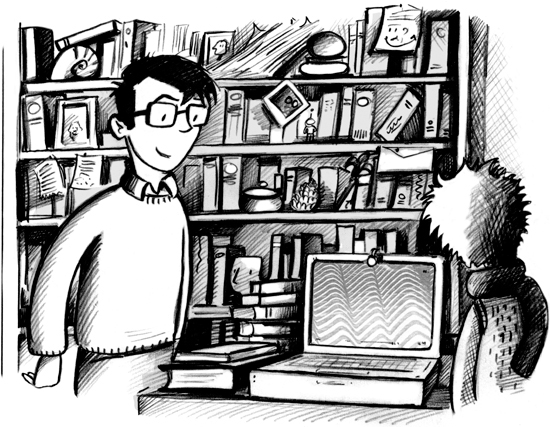Eric walked toward the doorway and stuck his head out into the hallway. “Ann-ie!” he shouted up the stairs.
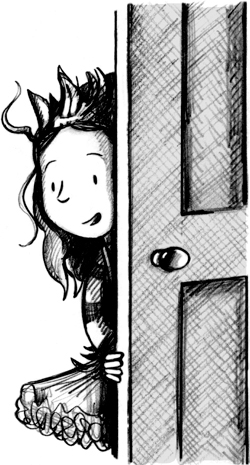
“Ye-e-e-es,” her distant voice tinkled down to them.
“Do you want to come and see The Birth and Death of a Star?” called Eric.
“Seen it already,” she sang back. “Lots of times.” They heard her feet pattering down the stairs, and a second later she stuck her head around the door. “Can I have some potato chips?”
“If we have any,” replied Eric. “And if we do, you’re to bring them into my library and share them with George. Okay?”
Annie smiled sweetly and disappeared into the kitchen. They heard the noise of cupboard doors being flung open.
“Don’t mind Annie,” said Eric gently, without looking at George. “She doesn’t mean any harm. She’s just . . .” He trailed off and went over to the far corner of the room, where he started fiddling around with a computer George hadn’t noticed before. He’d been too fascinated by the other objects to look at the flat silver screen with its keyboard attached. It was strange that George hadn’t spotted the computer right away—he really wished he could persuade his mom and dad to buy him one. He was saving up his allowance for a computer, but at the current rate, he calculated it was going to take him about eight years to afford even a really junky secondhand one. So instead, he had to use the clunky, slow, old machines at school, which crashed every five minutes and had sticky fingerprints all over the screen.
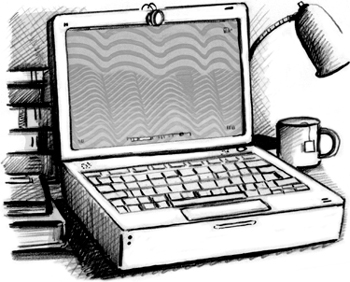
Eric’s computer was small and glossy. It looked powerful and neat—the sort of computer you might find on a spaceship. Eric hit a couple of buttons on the keyboard, and the computer made a sort of humming noise while bright flashes of color shot across the screen. He patted the computer happily.
“You have forgotten something,” said a strange mechanical voice. George jumped out of his skin.
“Have I?” Eric looked confused for a moment.
“Yes,” said the voice. “You have not introduced me.”
“I’m so sorry!” exclaimed Eric. “George, this is Cosmos, my computer.”
George gulped. He had no idea what to say.
“You have to say hello to Cosmos,” said Eric in a side whisper to George. “Otherwise he’ll get offended.”
“Hello, Cosmos,” said George nervously. He’d never spoken to a computer before, and he didn’t quite know where to look.
“Hello, George,” replied Cosmos. “Eric, you have forgotten something else.”
“What now?” said Eric.
“You have not told George I am the most powerful computer in the world.”
Eric rolled his eyes up to heaven. “George,” he said patiently, “Cosmos is the most powerful computer in the world.”
“That is correct,” agreed Cosmos. “I am. In the future, there will be computers more powerful than me. But there are none in the past or present.”
“Sorry about this,” Eric whispered to George. “Computers can be a bit touchy sometimes.”
“I am smarter than Eric, too,” boasted Cosmos.
“Says who?” said Eric crossly, glaring at the screen.
“Says me,” said Cosmos. “I can compute billions of numbers in a nanosecond. In less time than it takes you to say ‘Cosmos is great,’ I can compute the life of planets, of comets, of stars, and of galaxies. Before you can say ‘Cosmos is the most impressive computer that I have ever seen, he is truly incredible,’ I can—”
“All right, all right,” said Eric. “Cosmos, you are the most impressive computer we have ever seen. Now, can we move on? I want to show George how a star is born.”
“No,” said Cosmos.
“No?” said Eric. “What do you mean, no, you ridiculous machine?”
“I don’t want to,” said Cosmos snootily. “And I am not ridiculous. I am the most powerful computer that has ever been—”
“Oh, but ple-e-ease,” pleaded George, interrupting him. “Please, Cosmos, I really want to see how a star is born. Please won’t you show me?”
Cosmos was silent.
“Oh, come on, Cosmos,” said Eric. “Let’s show George some of the wonders of the Universe.”
“Maybe,” replied Cosmos sulkily.
“George doesn’t have a very high opinion of science,” Eric went on. “So this is our chance, Cosmos, to show him the other side of science.”
“He must take the oath,” said Cosmos.
“Good point—smart Cosmos,” said Eric, leaping over to the blackboard.
George turned and studied the writing on it more closely. It looked like a poem.
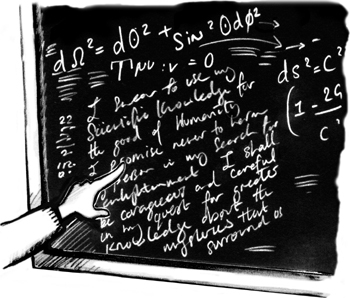
“George,” said Eric, “do you want to learn about the greatest subject in the whole Universe?”
“Oh yes!” exclaimed George.
“Are you prepared to take a special oath to do so? To promise that you will use your knowledge only for good and not for evil?” Eric was staring at George intently from behind his big glasses. His voice had changed—he now sounded extremely serious. “This is very important, George. Science can be a force for good, but as you pointed out to me earlier, it can also do great harm.”
George stood up straighter and looked Eric in the eye. “I am,” he confirmed.
“Then,” said Eric, “look at the words on the blackboard. It is the Oath of the Scientist. If you agree with it, then read the oath out loud.”
George read what was written on the blackboard and thought about it for a moment. The words of the oath didn’t frighten him. Instead they made him feel tingly with excitement, right down to his toes. He read the oath out loud, as Eric had instructed.
“I swear to use my scientific knowledge for the good of Humanity. I promise never to harm any person in my search for enlightenment . . .”
The living room door opened, and Annie sidled in, clutching a huge multipack bag of potato chips.
“Keep going,” said Eric encouragingly. “You’re doing very well.”
George read out the next part.
“I shall be courageous and careful in my quest for greater knowledge about the mysteries that surround us. I shall not use scientific knowledge for my own personal gain or give it to those who seek to destroy the wonderful planet on which we live.
“If I break this oath, may the beauty and wonder of the Universe forever remain hidden from me.”
Eric clapped. Annie burst an empty potato chip package. Cosmos flashed a rainbow of bright colors across his screen.
“Well done, George,” said Eric. “You are now the second youngest member of the Order of Scientific Inquiry for the Good of Humanity.”
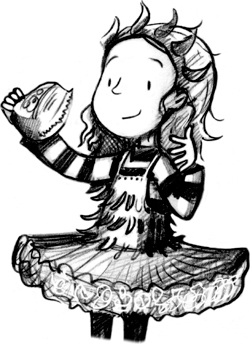
“I salute you,” said Cosmos. “From now on, I will recognize your command.”
“And I’ll let you have some chips!” piped up Annie.
“Annie, shush!” said Eric. “We’re just getting to the good part. George, you may now use the secret key that unlocks the Universe.”
“Can I?” asked George. “Where is it?”
“Go over to Cosmos,” said Eric quietly, “and look at his keyboard. Can you guess which one you need to press? Can you figure out which one is the secret key that will unlock the Universe for you? Annie—say nothing!”
George did as he was told. Cosmos might be the world’s most powerful computer, but his keyboard was just an ordinary, familiar one, with the letters and symbols laid out in the same order as even the school’s crummiest computer. George thought hard. Which key would be the one to unlock the Universe for him? He looked again at the keyboard—and suddenly he knew.
“It’s this one, isn’t it?” he said to Eric, his finger hovering.
Eric nodded. “Press it, George. To begin.”
George’s finger came down on the key marked ENTER.
Suddenly the lights in the room started to fade . . .
“Welcome,” said Cosmos, playing a little computerized fanfare, “to the Universe.”
